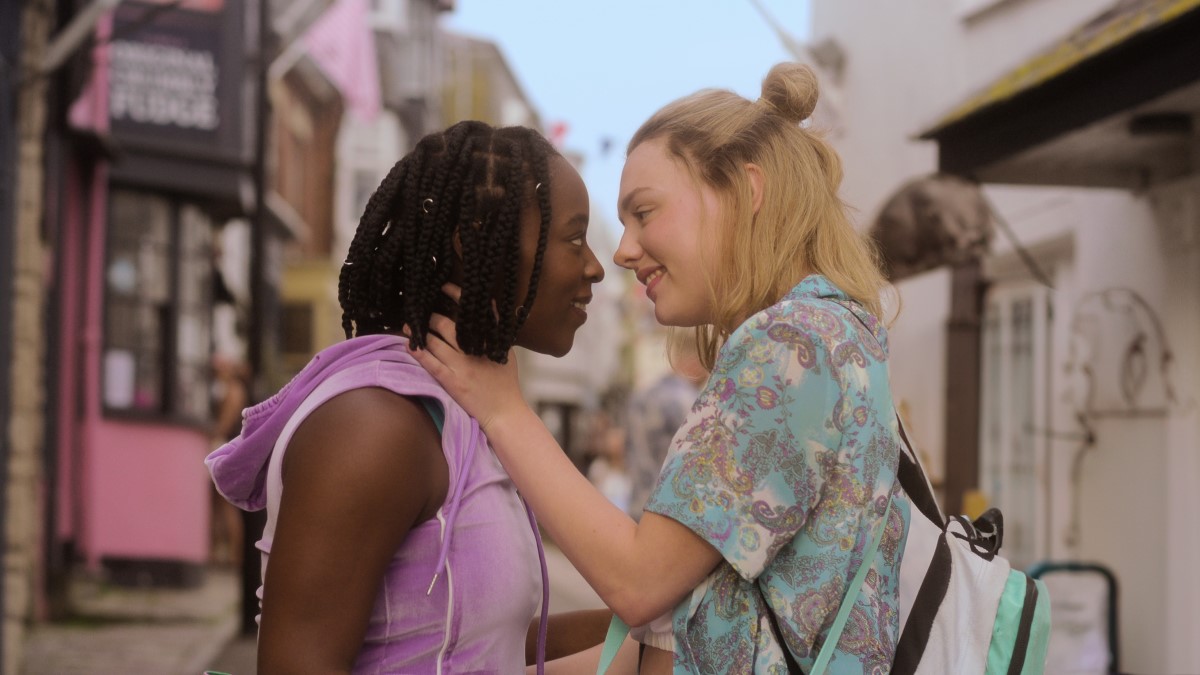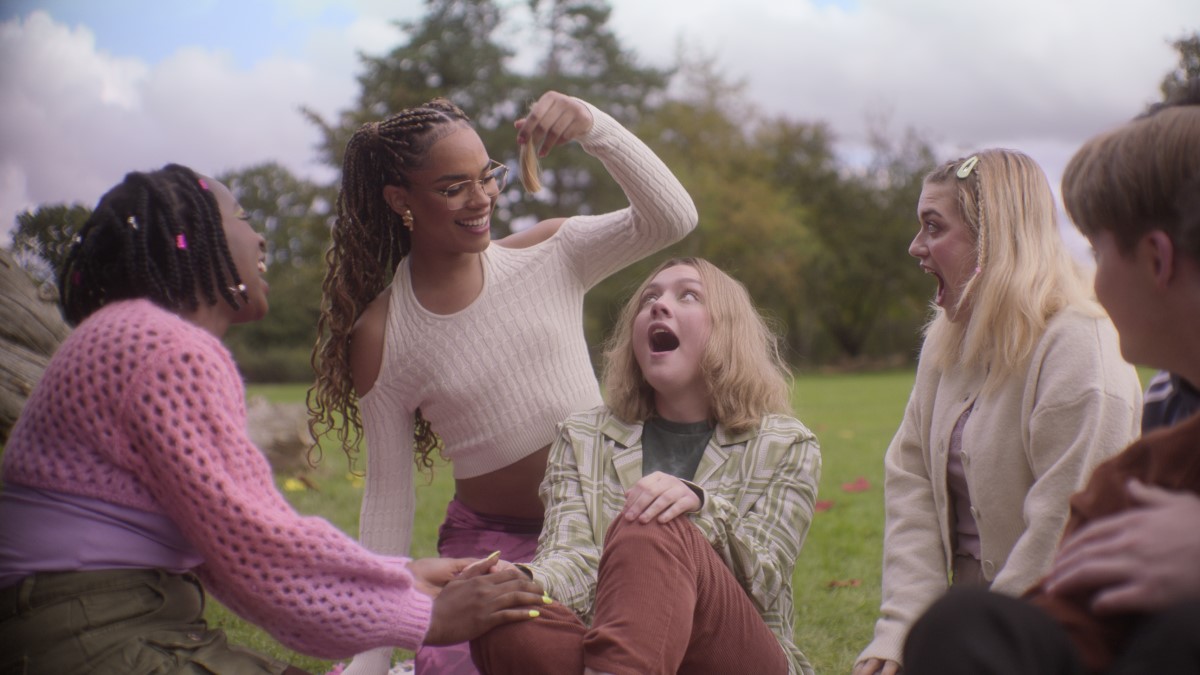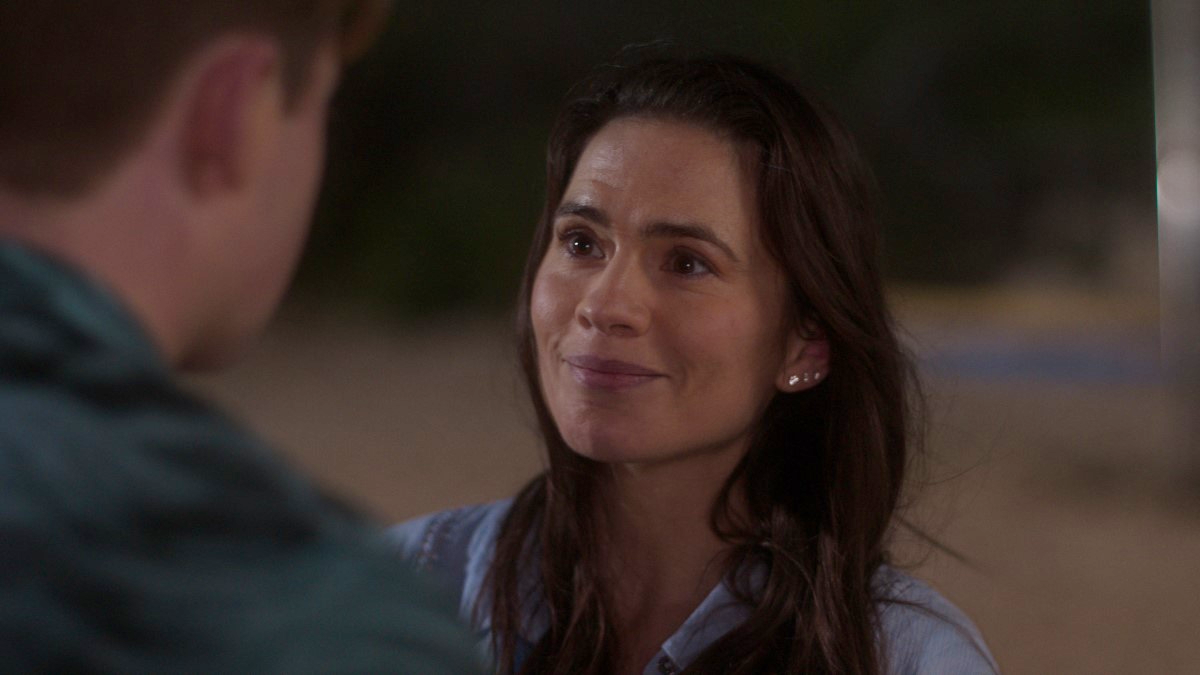In its third season, Heartstopper continues to be such a sweet, comforting display of queer love. And not just queer romantic love — queer platonic love and familial love, too. It’s so refreshing to have a story about young people where the queerness isn’t designated to a background character or a Very Special Episode. Most of the teens on this show are queer and/or trans, and that’s the whole point.
This season, almost everyone starts out coupled up. Charlie and Nick, obviously, but also Tao and Elle, and Tara and Darcy. Even Imogen and Sahar are paired off in a way on their trip to the beach, leaving Isaac to be paired only with his books. But of course, things aren’t all sunshine and sandcastles for these teens; there are plenty of stressors and dilemmas. Their problems are getting more mature as they start to grow up, turning 16 and 17, including, but not limited to, friendships, relationships, eating disorders and self harm, finding your identity outside of your relationship, the pressures of life, being ready (or not) for sex, and more.
For Tara and Darcy, they’re trying to navigate living together after Darcy left home to escape an abusive and homophobic mother. Darcy couldn’t be happier, but Tara feels like she could use a little space. It’s hard when you’re teenagers, because it’s not like they live in an apartment together; they’re essentially only sharing Tara’s bedroom, and it’s becoming a little much. They navigate it carefully though, and their relationship stays strong.

They are just so cute, I cannot.
Darcy also goes on a bit of a gender journey throughout the series. It’s subtle, and in the background, but I think it’s lovely how it progresses. It starts with small things: Darcy not liking when strangers call the group “ladies,” giving away long abandoned dresses, and then wearing slacks with the school uniform. Seems right in line with the Darcy we’ve known the past two seasons. Then it’s a haircut that’s more masc-presenting, and eventually Darcy asks their friends to use they/them pronouns for them and toys around with the nonbinary label. It’s a slow progression over the course of the season, and their friends support them at every turn by encouraging them to be themselves, whoever that is. I also saw an interview with Darcy’s actor Kizzy Edgell, who has been on a gender journey also and now uses he/him and they/them pronouns, where they say they were consulted extensively for this arc.

I got my first undercut surrounded by friends at a Bad Lesbian Movie Brunch, highly recommend this experience.
Isaac also goes on a bit of a journey with being asexual and aromantic, Elle experiences microaggressions that have her seeking support in her trans art friends, and even Imogen realizes that maybe it’s not a coincidence that most of her friends are queer and that perhaps she’s been performing compulsory heterosexuality this whole time. There are so many little and big queer moments throughout this entire show, and they’re all done so thoughtfully.
The fact that there’s too much to parse out in too much detail, is exactly why I love this show. Very often on TV, a queer character will be the only one in their group of friends. Sometimes their partner will get added to the group in time, but not always. And while that’s common with people who are just coming out, in my experience, it doesn’t stay that way for long. Eventually you seek community and drift away from being the token gay in any given group. Because it can be an exhausting way to live. So it feels more realistic to me that a bunch of the queer kids in this school have found each other and created a bond. Together, they can be themselves, they can be free.
Another storyline that really resonated with me this season was Charlie’s more personal struggles. I saw parts of myself in Charlie as he struggled with an eating disorder and other mental health issues; I saw part of myself in Nick, watching someone he cares about struggle and not knowing what to do about it, wanting to help and fix it yourself, not realizing that’s too much for a teenager to take on; and I saw myself in Charlie’s sister, wanting to do anything in her power to help her little brother but not knowing how. It was a powerful story all around, and watching Charlie learn how to be gentler with himself and start to heal was really beautiful and impactful to me.
One of my favorite things about Heartstopper is how the teens are all having hard conversations. With each other, with trusted adults, with themselves. Even if some of the language is very obviously scripted by adults, these types of conversations are so important to model to teens so they can think about how to talk about these topics in their own lives. Teenagers who are struggling often don’t know how to ask for help because they don’t have words to express what’s wrong. Whether it’s Charlie talking about his eating disorder, Elle talking about her dysphoria around sex, Isaac talking about being asexual/aromantic; these are all the types of conversations that are hard to have, and also the types of feelings that are hard to be experiencing if you’ve never heard anyone else talk about them. They could be feelings that make you feel very isolated and alone if you don’t know that other people feel the same way you do, and a show like this helps spread the fact that it’s actually not weird to feel any of these things.
Of course, it’s not all Big Feelings and Hard Conversations. There’s also plenty of sweetness and cuteness that will have you smiling until your cheeks hurt. There are also some really great jokes (my personal favorite were the ones where Charlie complains about Marvel, since he is now in the hot Marvel project, Agatha All Along), endearing scenes, and all-around fun moments for the kids. There’s also a lot of the teen boys who AREN’T dating each other talking about their feelings and saying “I love you” and hugging each other and it’s just so sweet and honest and emulating a non-toxic kind of male friendship. Plus, the music is, as always, amazing. AND HAYLEY ATWELL IS IN IT. Speaking of Marvel, my darling Peggy Carter, here to be a supportive aunt to Nick.

I want her to be my therapist.
As important as the heavier topics are, I do think that the moments where Charlie and his friends are all just having fun are my favorite. This group has an adorable gay boy and his adorable bi boyfriend, a trans girl and her boyfriend, an asexual aromantic, a non-binary person and her lesbian girlfriend, a fat bisexual, and a girl who is figuring her shit out, and they’re all laughing and dancing and having a great time together. They’re all happy. That’s the kind of representation we need — there is no shortage of queer tortured teen representation, but the happy ones? The hopeful ones? The ones who have been through shit but are not only surviving but thriving? Those are the ones that are going to change the world.

I LOVE QUEER FRIENDSHIP
There’s a moment in this season where one of the adult gay characters, one of Charlie’s teachers, is encouraging Charlie to apply to be Head Boy for his class. He says it would mean a lot to the younger students to see someone like Charlie as Head Boy. As he says this, he sees a young version of himself sitting in the classroom, and that’s how I feel about this series. I’m looking at these happy queer teens and thinking of how much this would have meant to my younger self, how Heartstopper would have changed my whole life. Instead of being sad for her that she didn’t have that chance, I find myself elated that there are kids out there who do now.
Heartstopper season three is streaming on Netflix.



I know some people find this series too wholesome or cloying or whatever, but I adore it. I am someone who tends towards darker stories in literature, TV, and books, so Heartstopper is not my usual fare, but each season I am impressed with how they are able to strike a tone that works –– it’s like, yes, is the dialogue often aspirational (these 16yos are so emotionally articulate!)? Are brewing issues often resolved unrealistically smoothly or swiftly (eg., Darcy understanding and accepting why Tara needs personal space, without getting defense or hurt or whatever?). Yes. And yet the genuine sweetness and good humor and focus on connection (romantic, friendship, familial, and intergenerational – I also love the role that the 3 queer teachers/coach play in their lives) makes it work for me, even if at times it requires some suspension of disbelief. One of my favorite parts are the depictions of physical and verbal intimacy among the characters, across queer/gender/relationship lines. (I watch my 5-year-old boy hold hands frequently with his best friend, another cis boy, and I already mourn the day when they may sense it’s ‘not something you do’ with friends…. so Tao and Charlie, Isaac and Charlie, even Nick and Imogen’s friendship are all so sweet).
Valerie I too think about what it would have been like to be 13 and watching this, and it makes me emotional. When I was 13 I had t.A.T.U. and… Boys Don’t Cry (which I had to watch secretly), I guess? Yikes. Plus Scully of course.
I am excited to watch Heartstopper again with my 8-year-old before too long. So many of the conversations around all kinds of consent, and accepting people as who they are (and recognizing that that may change over time), and even in season 3 about how much more expansively we can understand the category of having sex as not just about penetration, all feel powerful for young teens to see modeled for them, and articulated, as the show does. Thanks for writing about this!
i agree. it’s not my usual thing but these kids charm the pants off of me!
So much of this season just felt like Alice Oseman on a soapbox. I wish they had been more subtle and shown through story rather than told – eg. I don’t mind earnestness and I think their message is great but I do think it can be shown through realism rather than preaching.
The show seems pretty heavy-handed to me at nearly 30, but I keep watching because of the experience you outline in your last paragraph: knowing how it would have made me feel had I seen it in my youth. Thanks for the review.
Small but significant correction: Nick is bi not gay (I assume it’s him and Charlie you’re referring to as ‘two adorable gay boys’ – you’re right about them both being adorable though!)
You know, you’re right. I was using ‘gay’ as an umbrella term but in this context you’re super right that the distinction is important, I’ll correct that! Thank you!
I agree with some of the other comments. I love so much about this show but parts of it just felt so stilted and unnatural! I think it shines when the actors are allowed to focus on their chemistry and their feelings rather than the more explanatory – I am going to lecture the audience about X thing – parts.
As an aside, I really struggled with Isaac’s plotline. I adore the actor who plays Isaac and love having more asexual representation. But it just feels like his character feeds into this dangerous narrative that people don’t need to talk to their loved ones about their experiences?? When he said “I don’t want to give a vocab lesson” my head almost exploded. Why are we portraying having intimate conversations about our experiences with the people closest to our lives as something negative?? Yes offensive questions are not okay, but do we really want to tell kids that ANY questions are “asking for a vocab lesson” rather than trying to understand one another???
That Isaac exchange you mention really got under my skin too, for the same reasons. Reading these other comments reminded me of a handful of particular moments in season 3 that did feel way overly didactic and stilted… The show has always had an earnest awareness of modeling a different kind of vulnerability, articulation, and sociality for tweens/teens, but the heavy-handedness felt particularly heavy this season even compared to the first two.
Think back to Olivia Coleman’s response to Nick coming out to her in season 1… even though clearly the dialogue was crafted to make certain points (like her saying “you know you don’t have to like girls” and him insisting “but I do” to insist that he does know himself, he is bi, not just ‘seguing’ from straight to gay), it felt natural and true to the characters. In contrast, there were definitely beats in season 3, like the Isaac exchange, that rang hollow.
I think when I watch, I ride the chemistry and feelings, as you say, and try to ignore the more rote Queer Teens 101 dialogue, but that probably means I’m too generous in my evaluation!
I don’t feel like the show is too heavy handed with it’s messaging. I’m not saying it’s perfect but I feel like there is a good balance. As someone older, it makes me emotional to know that kids have something like this to watch. I have a bit of sadness that I didn’t have it growing up but more than that, I feel happy that people have it now. It doesn’t any away from difficult themes and topics but it is ultimately hopeful and that can’t be said for a lot of things.
This was well thought out and articulated and I think gets to a really essential point that queer media (TV and movies, especially) does not have to be perfect to be good. Is Heartstopper perfect rep and does it handle all of the conversations exactly how it should? No, definitely not. But is it sweet and wholesome and earnest in its attempt? Absolutely and I think there’s a lot of merit to that in and of itself.
I think because of the genuine scarceness of queer stories in media we tend to get really caught up on queer media not representing the community in the ways we want (often rightfully so) without also giving it grace to be imperfect or cheesy or heavy handed or, yes, even bad! These things can coexist! We contain multitudes!
I’m not sure I’m articulating this well (There’s a good bit on this in a semi-recent episode of The Chosen Family Podcast) and is not meant to call anyone out. I’m more just trying to invite us all into a broader, more nuanced conversation around what queer media is and can be :)